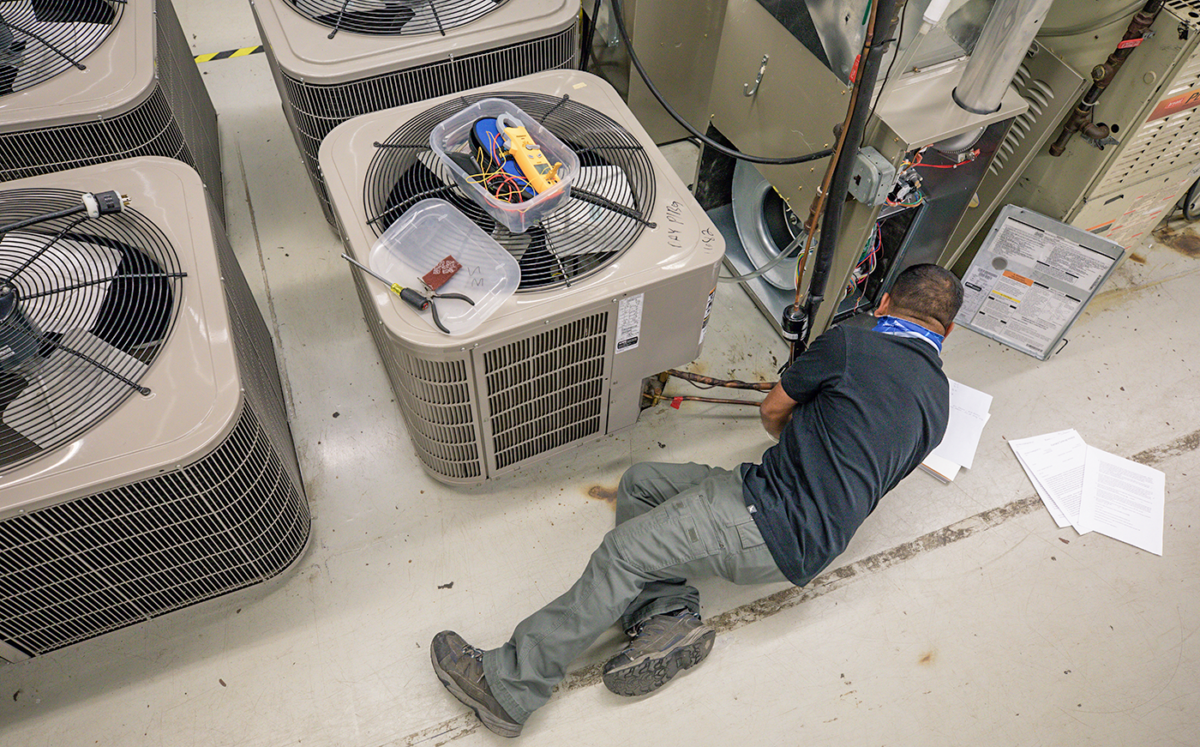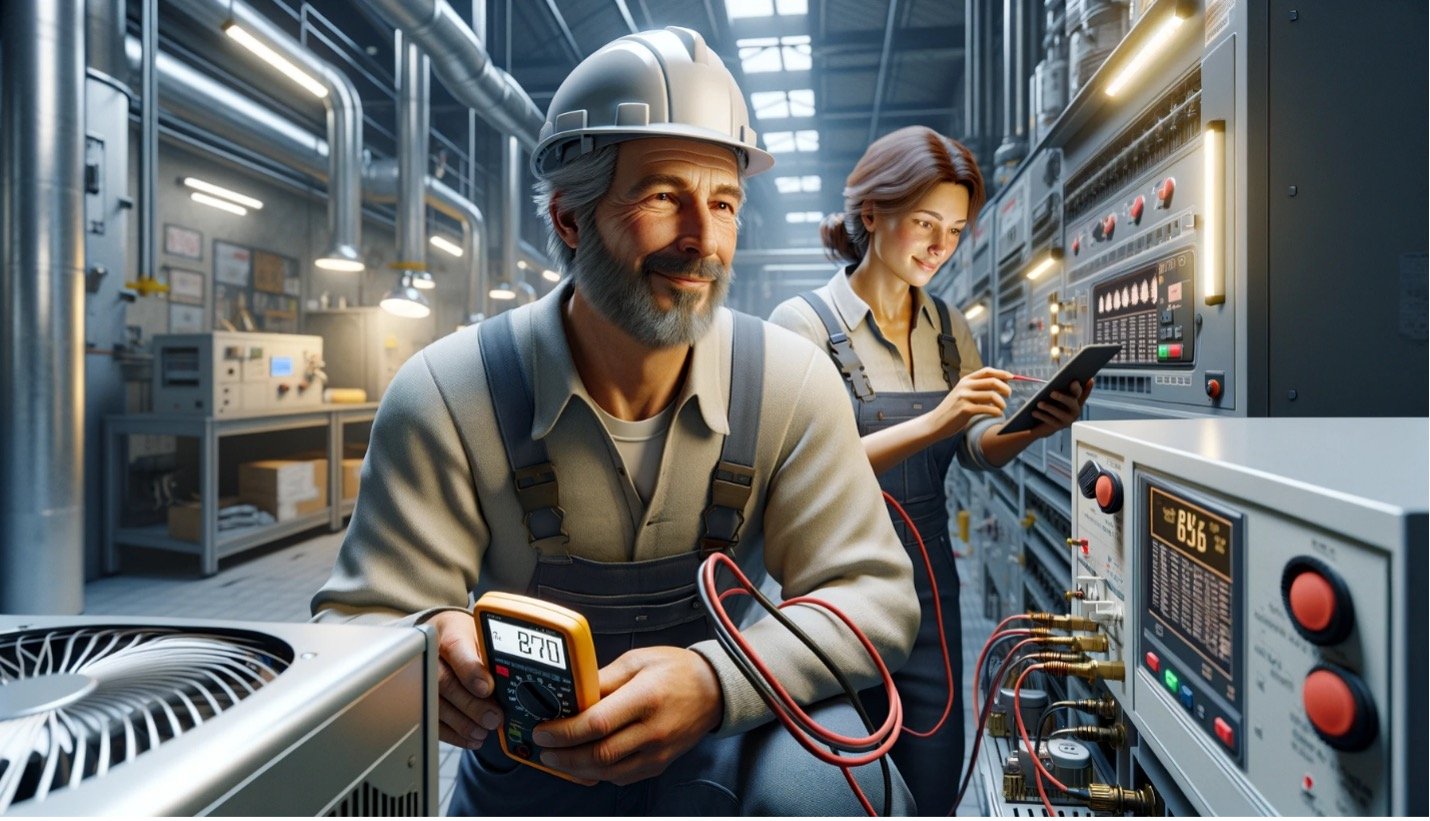HVAC Contractor for Reliable Cooling And Heating Providers
HVAC Contractor for Reliable Cooling And Heating Providers
Blog Article
A Comprehensive Appearance at Heating And Cooling Services and Their Influence On Power Efficiency and Expense Cost Savings
The duty of HVAC services in improving power performance and achieving expense financial savings is extra vital than ever before, as companies and house owners seek sustainable options in a significantly eco-conscious globe. With technical advancements like smart thermostats and high-efficiency elements, the possibility for maximizing system efficiency is vast. Yet, truth influence of these developments depends greatly on routine maintenance and aggressive issue management. As we check out the complex partnership in between HVAC systems and operational prices, consisting of the shift in the direction of environmentally friendly alternatives, the inquiry arises: how can these techniques be effectively executed to take full advantage of both eco-friendly and economic benefits?

Relevance of HVAC Systems
heating and cooling systems are an essential element of contemporary buildings, playing an important role in preserving comfortable and healthy and balanced interior settings. These systems, encompassing home heating, air, and ventilation conditioning, are important for controling temperature, moisture, and air high quality, thus making certain the wellness of occupants. Reliable cooling and heating systems contribute dramatically to developing an ideal interior climate, which is crucial for both business and household areas.
In industrial buildings, heating and cooling systems are important to giving a productive and risk-free atmosphere. By controlling indoor environment conditions, these systems assist avoid the development of mold and the spread of air-borne contaminants, hence protecting the health and wellness of consumers and employees. Furthermore, in household setups, a/c systems boost living conditions by supplying constant thermal convenience and boosting indoor air top quality, which is vital for general wellness.
Furthermore, the layout and maintenance of heating and cooling systems have a direct effect on energy consumption and operational expenses. Effectively made and preserved systems can considerably reduce energy use, causing reduced utility costs and a smaller carbon footprint. The performance of these systems thus plays an essential duty in advertising sustainability and energy conservation within structures, highlighting their significance in the modern-day building landscape.
Advances in HVAC Technology
Advancement in a/c modern technology is changing the way structures take care of interior environments, introducing a brand-new period of performance and control. Recent developments have concentrated on enhancing energy usage while boosting customer comfort. One significant advancement is the combination of wise thermostats, which use man-made knowledge to discover occupancy patterns and change temperatures accordingly, lowering unneeded power use.
Variable Cooling Agent Flow (VRF) systems represent an additional considerable leap onward. These systems enable exact temperature control in different zones of a building, enhancing comfort and minimizing power waste. VRF technology is particularly advantageous for large commercial rooms, using flexibility and scalability.
Additionally, the advent of Net of Points (IoT) gadgets has changed cooling and heating systems right into interconnected networks qualified of real-time information collection and analysis. This connection allows predictive maintenance, ensuring systems run at peak effectiveness and reducing unanticipated downtime.
Additionally, advancements in materials and layout, such as using high-efficiency coils and compressors, have enhanced overall system efficiency - Heating Contractor. The adoption of eco-friendly refrigerants likewise highlights the market's dedication to sustainability
These technological developments are critical in reducing operational costs and ecological impact, establishing brand-new requirements for developing environment management.
HVAC Upkeep and Effectiveness
Guaranteeing ideal performance of HVAC systems extends past technological developments; it also pivots on reliable upkeep methods. Normal upkeep is important for maintaining performance, decreasing power consumption, and expanding the life expectancy of heating and cooling systems. The key goal is to make certain that all components operate at their peak potential, thereby lessening power waste and maintaining regular interior comfort levels.
Routine maintenance jobs, such as cleansing or replacing air filters, inspecting refrigerant degrees, and checking ductwork for leakages, are necessary for stopping unnecessary pressure on the system. Clogged up or dirty filters can obstruct airflow, causing the system to function more challenging and consume even more power. Likewise, poor refrigerant levels can lower cooling down effectiveness, leading to greater operational expenses.
In addition, periodic examinations by certified experts can identify prospective issues before they escalate into expensive repairs or system failures. These examinations commonly consist of checking electric links, adjusting recommended you read thermostats, and ensuring the total honesty of the HVAC system. By dealing with small problems early, companies and property owners can avoid unforeseen failures and boost energy effectiveness.
Cost-efficient HVAC Solutions
For those looking to obtain one of the most out of their air, home heating, and air flow conditioning systems without damaging the financial institution, discovering cost-efficient cooling and heating solutions can make a significant difference. One prompt step is to buy programmable thermostats, which permit individuals to establish details temperatures for various times of the day, optimizing energy usage and decreasing unnecessary usage. By automating temperature level modifications, homeowners can achieve significant financial savings on power expenses.
Routine maintenance is an additional critical part of cost-effective a/c management. Ensuring that filters are cleaned up or replaced regularly, ductwork is sealed, and systems are serviced by experts can stop expensive repairs and improve system long life. Preventative upkeep not just maintains system efficiency yet likewise helps in preventing unforeseen malfunctions that can bring about pricey emergency repair work.
Additionally, retrofitting existing systems with energy-efficient elements, such as variable speed motors or high-efficiency compressors, can be a prudent investment. These upgrades improve functional effectiveness, minimize power use, and can frequently be executed at a fraction of the price of a complete system substitute.
Ecological Influence Reduction
Reducing the environmental impact of Cooling and heating systems is crucial in today's pursuit of lasting living. A/c systems are significant contributors to energy intake, accounting for almost 40% of power use in commercial buildings.
Technical advancements in HVAC layout and operation, including the assimilation of wise thermostats and energy-efficient warmth pumps, are critical in reducing carbon footprints. These innovations permit enhanced energy use, lessening waste and improving general system efficiency. Furthermore, taking on regular upkeep techniques ensures HVAC systems operate at peak performance, more stopping unneeded energy usage.
Additionally, the use of eco-friendly cooling agents is important, as typical refrigerants, like CFCs and HCFCs, have been phased out due to their ozone-depleting buildings. Modern choices, such as hydrofluoroolefins (HFOs), deal decreased environmental risks, lining up with global environmental protocols. By accepting these lasting techniques, heating and cooling services can play a transformative function in minimizing environmental effects, promoting power efficiency, and promoting a much more lasting future.
Verdict

Furthermore, the style and upkeep of HVAC systems have a straight effect on power consumption and functional costs. Regular maintenance is essential for sustaining efficiency, minimizing power consumption, and expanding the life period of HVAC systems. Heating and cooling systems are significant factors to power usage, accounting for nearly 40% of energy use in industrial buildings. Additionally, embracing routine maintenance practices guarantees Heating and cooling systems run at peak effectiveness, more curtailing unnecessary energy intake.
The transition to eco friendly A/c systems even more promotes and decreases operational expenses sustainability. Learn More (Heating Contractor)
Report this page